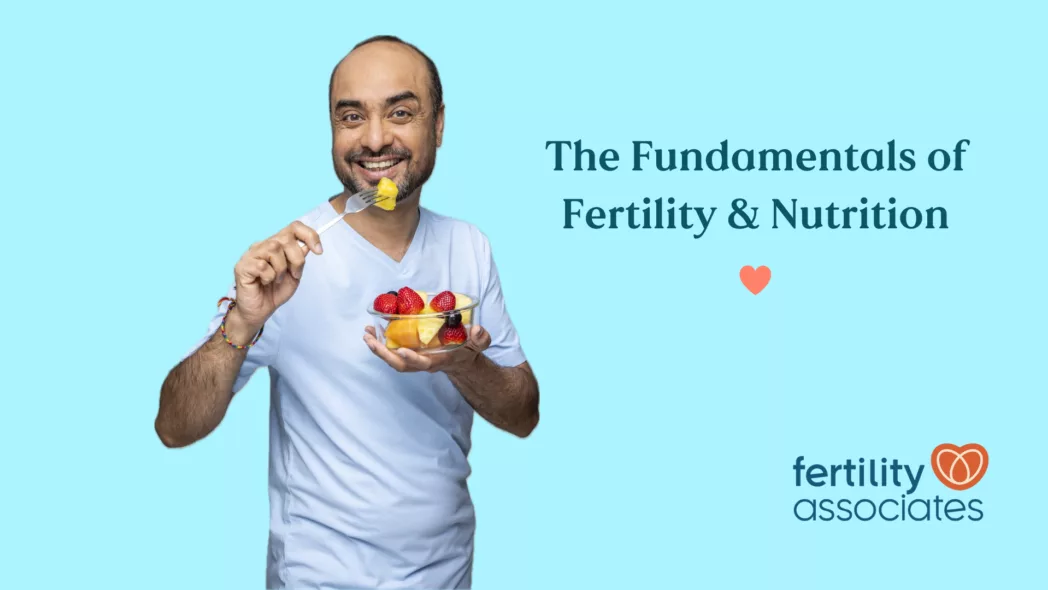Our Dietitian
Make an appointment to see our Dietitian Alice Gormack for a tailored fertility nutrition plan. Alice specialises in fertility disorders and pregnancy nutrition.
You're welcome to email Alice and ask her a question regarding your lifestyle and about eating well to prepare for pregnancy.
She can be contacted on agormack@fertilityassociates.co.nz
Meet our Dietitian
Book an appointment
Alice is based in our main clinic in Auckland (Remuera) and Fertility Associates North Shore. She is also available for online/phone consultations, such as for people living in other parts of New Zealand.
You do not have to be a Fertility Associates patient to make an appointment to see Alice. To book a consultation, please click here.
The Fundamentals of Fertility & Nutrition
Did you know what you eat has a huge impact on your overall fertility? Often small adjustments to your diet can positively impact the chance of conceiving. In this webinar, our fertility Dietitian, Alice Gormack, will guide you through general nutrition and lifestyle advice to help you achieve your optimal fertility. She will cover topics such as which supplements are ok to take, clean eating for good egg and sperm health, nutrition for PCOS and endometriosis, and MORE!
Mediterranean-style nutrition
There is increasing evidence that a Mediterranean-style food intake reduces the risk of having difficulty becoming pregnant and may improve the chance of pregnancy using treatment.
What is Mediterranean-style nutrition? Eat plenty of colourful vegetables, fruit, fish and seafood, beans and legumes, nuts, seeds, olive oil, poultry, wholegrain carbohydrates and dairy products. Minimise processed foods, 'white' carbohydrates, sugary drinks, treat foods, takeaways and have red meat less often. While the relationship between nutrition and fertility is still being studied, following this dietary pattern is great for our health anyway.
Eat breakfast, lunch and dinner each day
Don’t panic about your meals needing to be perfect – a piece of fruit, some yoghurt or a couple of slices of brown toast are all better than skipping a meal or buying something less healthy.
Choose lots of wholegrain (brown) carbohydrate foods – these are great for B-vitamins and dietary fibre. Unless you have Coeliac disease or are trialing a low FODMAP diet then you do not need gluten-free foods.
Eat plenty of fruit and vegetables
Fruit and vegetables give us loads of vitamins, antioxidants and fibre. Aim for at least two handfuls of fruit and three handfuls of coloured vegetables per day - more is even better!
- You don't need to buy organic fruit and vegetables – just wash them thoroughly and peel if necessary.
- Frozen vegetables are an excellent choice, and often much cheaper than buying fresh.
- Canned fruit and vegetables are also good; aim for low sugar/low salt varieties and look for BPA-free cans where possible.
- Choose plenty of colourful vegetables with your main meals; the vitamin C in these will increase your iron absorption.
- Choose pieces of fruit rather than fruit juice. Juice contains the same high level of sugar as soft drink and you miss out on the beneficial and filling effects of the fibre.
Choose lean protein
Most New Zealanders eat plenty of protein, and it’s unlikely that you’ll need more while having fertility treatment. Choose a mixture of animal and plant-based proteins for a well-balanced intake.
Oily fish is our best source of long-chain omega-3 fats which are excellent for our fertility and overall health. Include two servings of oily fish each week, such as salmon, tuna, sardines, or mackerel. From a mercury perspective, most fish and seafood varieties commonly eaten in NZ (including canned tuna) are safe at around 3-4 servings per week.
Red meat is the richest source of easily absorbable iron but also contains saturated fat. For this reason, keep to small portions, lean cuts and have 1-2 servings of red meat a week. Avoid processed red meats like bacon, salami, ham, sausages, and jerky. These appear to reduce sperm quality and potentially worsen female fertility conditions like endometriosis, PCOS and fibroids. If you are low in iron, choose lean red meat at least twice per week.
It is great to include a variety of plant-based protein foods such as legumes (chickpeas, beans and lentils), tofu/tempeh, and nuts and seeds. This is especially important if you follow a vegetarian or vegan intake. Chia seeds, walnuts, flaxseeds/linseeds are good plant-based sources of omega-3 fats for those who do not eat oily fish.
Keep your calcium intake up
Dairy products are our main source of calcium and a good source of protein too. Reduced-fat dairy products are usually higher in calcium and protein than standard products, and lower in saturated fat. Check the sugar content for yoghurts and aim for unsweetened varieties where possible. If you prefer flavoured yoghurt, choose one with less than 8-9g sugar/100g of yoghurt (check the nutritional panel).
Reduced fat cow's milk dairy products are excellent from a nutritional perspective. If you are lactose intolerant or avoiding cow’s milk for any reason, the best substitute is fortified soy milk. Rice, oat, almond and coconut milks contain minimal protein and calcium; make sure to choose calcium-fortified products if you use plant-based milk. Most lactose intolerant people will be able to eat regular yoghurt and cheese without issue as these products are much lower in lactose.
Cheese is high in saturated fat, and doesn’t contain as much calcium or protein as milk and yoghurt. Keep serving sizes small and avoid double or triple-cream varieties.
Non-dairy sources of calcium include broccoli, leafy green vegetables, almonds, chia and sesame seeds, dried fruit, beans and lentils, and tinned fish with bones.
Switch from saturated to unsaturated fat
Saturated fat is not good news for fertility; this type of fat is pro-inflammatory. Most of the saturated fat in our food intake comes from meat fat, chicken skin, takeaways, pastry-based items, butter, high-fat dairy products and processed snack foods (e.g. baking, crisps and chocolate). Coconut products are also high in saturated fat so are not a healthy choice.
Margarine is a better option than butter as it is made from liquid plant oil. If you prefer not to use margarine, choose avocado, hummus or a nut-based spread instead.
Unsaturated fats are anti-inflammatory and are very good for us. Food sources of unsaturated fats include nuts, seeds, oily fish, avocado and liquid plant oils. Keep portions small for weight control.
Avoid caffeine and alcohol
Coffee and alcohol are a common part of life in New Zealand; making changes to your intake might feel difficult.
Despite this, avoiding alcohol and limiting caffeine is important as these drinks have been shown to decrease fertility in both sexes in some studies. Lots of people wait until their fertility treatment begins before cutting back, but it is beneficial to start well in advance (at least several months prior to treatment).
Common sources of caffeine are coffee, tea, green tea, cola, kombucha and energy drinks.
Cocoa-containing food and drinks (chocolate, drinking chocolate) also contain caffeine but only a small amount.
One cup of regular coffee or tea per day is unlikely to have a negative effect on your fertility, but choose decaffeinated/caffeine-free varieties for the rest of your drinks over the day. Limit alcohol as much as possible for both men and women, and women should stop alcohol completely at embryo transfer.
Water and reduced-fat milk are the healthiest drinks.
Take a folic acid supplement
You don't need to take lots of nutritional supplements during or prior to fertility treatment; if you consume a wide range of foods then you should have adequate amounts of vitamins, minerals and fibre. Nutrients are often better absorbed from food than capsules too.
The exception is folic acid; women need to be taking 800mcg/day (also called 0.8mg) of folic acid for at least 4 weeks prior to fertility treatment and for the first 12 weeks of pregnancy. Some women need higher levels of folic acid – your doctor will advise you if you need more.
If
you become pregnant, your doctor will also give you a 150mcg/day iodine
supplement to take while pregnant and breastfeeding. You can choose
between getting an 800mcg folic acid supplement and the Neurokare 150mcg iodine
supplement on prescription from your doctor, or use ‘Elevit with Iodine’.
Aim to get omega-3 by consuming oily fish 1-2 times per week and B-vitamins
from wholegrain carbohydrates.
Ensure you have enough iron and selenium
Women with low iron should make specific dietary changes, and take a prescription iron supplement.
Many New Zealanders also have low selenium intake. 1-2 Brazil nuts per day will meet your daily requirement while sesame seeds, sunflower seeds, meat, chicken, eggs and seafood are also good sources.






